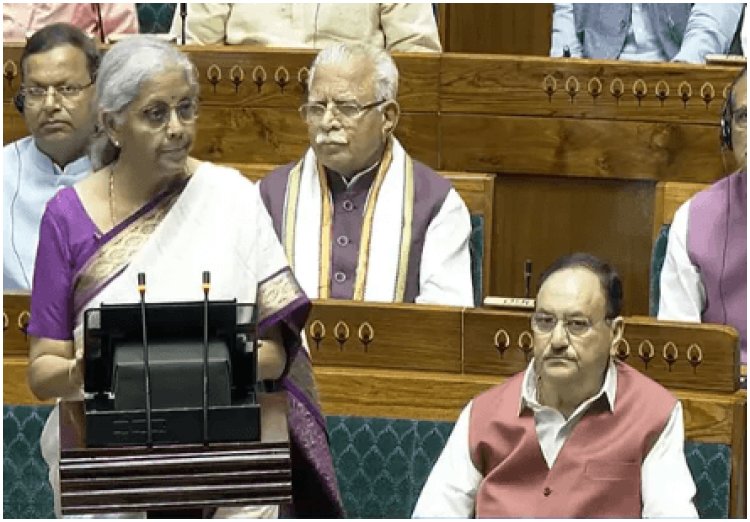Budget 2024: Key Winners and Losers in a 'Vulnerable' Stock Market
Budget 2024: Key Winners and Losers in a 'Vulnerable' Stock Market

Budget 2024 announcement has stirred significant reactions among investors, revealing a distinct set of winners and losers in an already vulnerable stock market.
The measures introduced by the government aim to stimulate economic growth, tackle inflation, and address social issues, but their implications for various sectors and individual companies are multifaceted and complex.
On the winning side, the technology sector has emerged as a major beneficiary. The government's increased investment in digital infrastructure and incentives for tech startups have buoyed investor sentiment. Companies involved in cybersecurity, artificial intelligence, and cloud computing have seen their stock prices rise. The budget's emphasis on fostering innovation and digital transformation is expected to drive long-term growth in this sector, making it a safe haven for investors amidst broader market volatility.
Renewable energy companies have also received a boost. The budget includes substantial funding for green energy projects and tax incentives for companies involved in solar, wind, and other renewable sources. This move aligns with global trends toward sustainability and is anticipated to generate significant investment in the sector. Investors have responded positively, pushing up the stock prices of firms that are well-positioned to benefit from the shift towards a greener economy.
Healthcare is another sector that stands to gain. The government has allocated increased funding for public health initiatives and research, which is likely to benefit pharmaceutical companies and biotech firms. Stocks of companies involved in developing new treatments and healthcare technologies have rallied on the back of these announcements. The focus on strengthening the healthcare system post-pandemic is seen as a crucial step in ensuring long-term economic stability.
However, the budget has not been favorable for all sectors. Traditional energy companies, particularly those involved in fossil fuels, have been hit hard. The government's commitment to reducing carbon emissions and shifting towards renewable energy has led to a sell-off in oil and gas stocks. Investors are wary of the long-term prospects for these companies, given the increasing regulatory pressures and the global move away from fossil fuels.
The real estate sector has also faced challenges. The budget includes measures to cool the housing market, such as increased property taxes and tighter regulations on real estate transactions. These steps are intended to address the issue of housing affordability but have resulted in a negative reaction from investors. Real estate stocks have declined as a result, reflecting concerns over reduced profitability and slower growth in the sector.
Retail and consumer goods companies are another group that has been adversely affected. The budget's focus on increasing taxes on luxury goods and implementing stricter import regulations has dampened investor enthusiasm. Companies that rely heavily on imported goods or cater to high-end consumers are likely to face increased costs and reduced demand, leading to a drop in their stock prices.
Financial services, particularly banks, have experienced mixed outcomes. On one hand, the budget's provisions for financial inclusion and support for small and medium enterprises (SMEs) are seen as positive steps. However, increased regulations and higher taxes on financial transactions have weighed on the sector. Investors are concerned about the potential impact on profitability, leading to a cautious approach towards banking stocks.
The transport and logistics sector has shown resilience despite the overall market vulnerability. The budget's investment in infrastructure projects, including roads, railways, and ports, is expected to drive growth in this sector. Companies involved in transportation and logistics have seen a positive uptick in their stock prices, reflecting optimism about the long-term benefits of improved infrastructure.
Small businesses, particularly those in the tech and renewable energy sectors, have been identified as potential winners. The budget includes various incentives and support measures for SMEs, aimed at fostering innovation and entrepreneurship. These initiatives are likely to attract investment into smaller firms that are agile and capable of capitalizing on new opportunities. However, SMEs in sectors facing increased regulations and taxes may struggle, highlighting the uneven impact of the budget across different industries.
Investors have also noted the broader economic context in which the budget has been introduced. With global markets facing uncertainty due to geopolitical tensions and economic slowdowns, the measures taken in the budget are seen as crucial in stabilizing the domestic economy. The government's approach to balancing growth with fiscal responsibility is being closely scrutinized, with market participants weighing the long-term benefits against short-term challenges.
Overall, the 2024 budget has created a complex landscape for investors. While certain sectors like technology, renewable energy, and healthcare stand to benefit, others such as traditional energy, real estate, and luxury retail face significant headwinds. The mixed reactions from the market reflect the varied impact of the budget's measures, underscoring the importance of strategic investment decisions in navigating a vulnerable stock market.
The government's focus on innovation, sustainability, and public health is likely to shape investment trends in the coming years. However, the increased regulatory and tax burdens on certain sectors will require careful consideration by investors looking to manage risk and capitalize on emerging opportunities. As the market adjusts to the new budgetary measures, the winners and losers will continue to evolve, reflecting the dynamic nature of the economic landscape.

 shivani
shivani 



